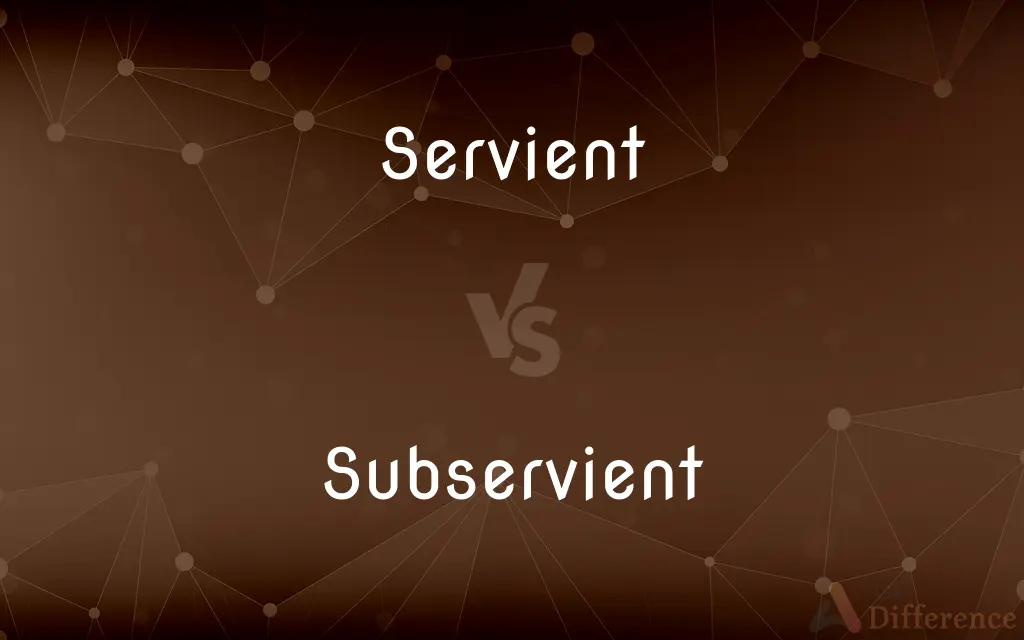Servient vs. Subservient — What's the Difference?
By Tayyaba Rehman & Urooj Arif — Updated on March 26, 2024
Servient emphasizes a legal or functional role, implying serving or being subject to a dominant entity, while subservient conveys a lack of autonomy, often used to describe excessive deference.

Difference Between Servient and Subservient
Table of Contents
ADVERTISEMENT
Key Differences
Servient is typically used in legal contexts, especially referring to property rights, indicating a property (servient estate) that provides benefit or service to another property (dominant estate). This term outlines a relationship defined by law or agreement, where the servient estate bears a burden for the sake of the dominant estate's advantage. Subservient, on the other hand, describes a condition of being excessively willing to act in accordance with someone else's wishes, often to the point of having little to no self-determination. This term is more broadly applied across various contexts, from personal relationships to workplace dynamics.
The distinction between servient and subservient extends into their connotations. While servient has a neutral to technical connotation, subservient carries a more negative or pejorative sense, often associated with unworthy or degrading submission.
In usage, "servient" is more restricted and specific, commonly found in legal documents, property law discussions, and formal agreements. It’s part of specialized vocabulary. Conversely, "subservient" is used more broadly in everyday language, discussions about social dynamics, and critiques of power relations, reflecting its wider applicability and emotional charge.
Although both terms involve a relationship of service or utility, the essence of their difference lies in the nature of the relationship and the autonomy of the party in service. A servient estate’s role is fixed and impartial, rooted in utility and legal obligations, whereas a subservient individual or group may be seen as having relinquished control or dignity, often due to pressure or coercion.
Comparison Chart
Definition
Refers to a property that serves another by bearing a burden or providing a benefit.
Describes a person or entity excessively willing to obey others, often implying a lack of autonomy.
ADVERTISEMENT
Context
Mostly used in legal, especially property law, contexts.
Applied broadly in various contexts, including social, psychological, and organizational dynamics.
Connotation
Neutral to technical, focusing on function or duty.
Negative, suggesting undue or demeaning submission.
Autonomy
The servient party has defined roles or obligations without implying inferiority.
The subservient party often lacks autonomy or dignity, suggesting a lower status or value.
Example Usage
E.g., A servient land provides access to a dominant land parcel.
E.g., They criticized the policy for encouraging subservient behavior among employees.
Compare with Definitions
Servient
Legal Term in Property.
In property law, a servient estate refers to land that provides an easement to another property.
Subservient
Behavioral Attribute.
Subservient attitudes can undermine one’s self-esteem and autonomy.
Servient
Neutral Connotation.
Servient tenements are essential for creating pathways and utilities access across lands.
Subservient
Negative Implication.
Being overly subservient in the workplace may prevent one from asserting their ideas.
Servient
Obligation-Based.
Servient lands are often subject to agreements that define their duties and benefits.
Subservient
Excessive Obedience.
The character’s subservient nature led her to agree to unreasonable demands.
Servient
Functional Role.
The servient property bears the burden for the benefit of the dominant estate.
Subservient
Lack of Autonomy.
Subservient individuals may struggle to make independent decisions or stand up for themselves.
Servient
Specific Application.
The driveway is part of the servient estate, granting passage to the neighboring lot.
Subservient
Widely Applicable.
Subservient roles in historical texts often reflect societal hierarchies of the time.
Servient
Subordinate
Subservient
Subordinate in capacity or function.
Servient
Subordinate.
Subservient
Obsequious; servile.
Subservient
Useful as a means or an instrument; serving to promote an end.
Subservient
Useful in an inferior capacity.
Subservient
Obsequiously submissive.
Subservient
Fitted or disposed to subserve; useful in an inferior capacity; serving to promote some end; subordinate; hence, servile, truckling.
Scarce ever reading anything which he did not make subservient in one kind or other.
These ranks of creatures are subservient one to another.
Their temporal ambition was wholly subservient to their proselytizing spirit.
Subservient
Compliant and obedient to authority;
Editors and journalists who express opinions in print that are opposed to the interests of the rich are dismissed and replaced by subservient ones
Subservient
Abjectly submissive; characteristic of a slave or servant;
Slavish devotion to her job ruled her life
A slavish yes-man to the party bosses
She has become submissive and subservient
Common Curiosities
Is being subservient always negative?
While it often carries a negative connotation, subservience can be context-dependent. In some cases, it might be seen as loyalty or cooperation.
What does "servient" mean?
"Servient" refers to a property that serves another by bearing a burden or providing a benefit, usually in legal contexts.
What does "subservient" mean?
"Subservient" describes a condition or behavior of excessive willingness to obey others, often suggesting a lack of autonomy or dignity.
Can a person be described as servient?
While less common, a person can be described as servient in contexts emphasizing their role or duty, especially in legal or formal settings.
Are subservient roles fixed in society?
Subservient roles are not inherently fixed and can change based on societal norms, individual actions, and cultural shifts.
Does subservience imply weakness?
While it might be perceived as such, subservience often stems from various factors including social conditioning, and does not inherently reflect personal strength or value.
How does the legal system use the term "servient"?
The legal system uses "servient" to describe a property that provides an easement or benefit to another property, highlighting a specific relationship defined by law.
Are there positive aspects of being subservient?
In some contexts, subservience might reflect loyalty or a willingness to support others, though it's important to balance with self-respect and autonomy.
Can a property be subservient?
Technically, properties aren't described as subservient because the term emphasizes emotional or behavioral submission, which applies to living entities.
How does subservience affect workplace dynamics?
Subservience in the workplace can lead to an unhealthy power dynamic, affecting morale, self-esteem, and productivity.
Is subservience a personality trait?
Subservience can be seen as a behavior or attitude, which may be influenced by personality, but it is not solely a personality trait.
Can a servient estate become dominant?
In legal terms, a servient estate's role is defined by specific agreements or laws, but changes can occur if the legal agreements are amended or terminated.
Can servient relationships be beneficial?
Yes, servient relationships, especially in legal contexts, can facilitate access, utility, and cooperation between properties.
How can one stop being subservient?
Overcoming subservience involves building self-esteem, setting boundaries, and practicing assertiveness to make independent choices.
Share Your Discovery

Previous Comparison
Concept vs. Construct
Next Comparison
Gnu vs. WildebeestAuthor Spotlight
Written by
Tayyaba RehmanTayyaba Rehman is a distinguished writer, currently serving as a primary contributor to askdifference.com. As a researcher in semantics and etymology, Tayyaba's passion for the complexity of languages and their distinctions has found a perfect home on the platform. Tayyaba delves into the intricacies of language, distinguishing between commonly confused words and phrases, thereby providing clarity for readers worldwide.
Co-written by
Urooj ArifUrooj is a skilled content writer at Ask Difference, known for her exceptional ability to simplify complex topics into engaging and informative content. With a passion for research and a flair for clear, concise writing, she consistently delivers articles that resonate with our diverse audience.














































